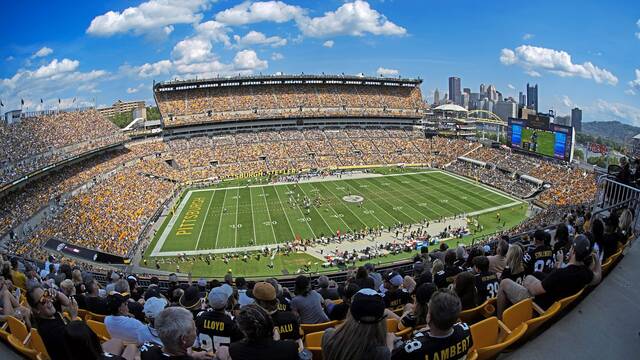Common Pleas judge rules Pittsburgh 'facility fee' for professional athletes unconstitutional
An Allegheny County Common Pleas judge last week struck down a City of Pittsburgh fee levied against professional athletes who play here, calling the fee an unconstitutional tax.
Judge Christine Ward granted a motion for summary judgment filed by three athletes, as well as the players associations representing Major League Baseball, the National Hockey League and National Football League.
In her order, Ward issued an injunction prohibiting the city from continuing to collect the fee.
A spokeswoman for the City of Pittsburgh did not immediately respond to a request for comment.
The plaintiffs, which included former Pittsburgh Penguin Scott Wilson; now retired MLB outfielder Jeffrey B. Francoeur; and NHL right winger Kyle Palmieri, filed suit against the city in November 2019, challenging what Pittsburgh officials called a “facility fee.”
The facility fee challenged in the lawsuit was applied to athletes who use the city’s sports venues, including PPG Paints Arena, PNC Park or Acrisure Stadium. Athletes who live in Pittsburgh paid a 1% assessment, while athletes who live elsewhere were charged a 3% assessment on their personal income earned while in Pittsburgh.
The fee was assessed differently for the different leagues — with NFL players paying based on what are called their “duty days” in Pittsburgh, including games and practices; and MLB and NHL players paying based on dividing the total number of games played in Pittsburgh by the total games played.
The lawsuit showed Francouer paying $510 to the city for three games played at PNC Park in 2015 when he was with the Phillies, and $758 for three games in 2016 when he was with the Marlins.
Palmieri said in the lawsuit he paid $1,902 in 2016 and $4,705 in 2018 for games played at PPG Paints Arena. Wilson played 33 games there in 2016 and paid $5,970 in taxes that year.
According to the lawsuit, the plaintiffs alleged that the city’s fee was actually an illegal tax because it treats resident and nonresident athletes differently. They argued that Pennsylvania’s Constitution requires uniformity in taxes across the same class of subjects.
Related:
• Pro athletes, players' unions seek to halt Pittsburgh 'jock tax'
Ward agreed, saying that the fee was a “clear violation,” of the uniformity clause.
“The facility fee is a tax in function, and should be recognized as such,” Ward wrote, finding that it more appropriately fits the definition of income tax since it is assessed on salaries and wages.
She said that the facility fee imposed by the city was not actually a fee as defined by law because it was not subject to supervision and regulation by a licensing authority. In addition, Ward said, no licensing authority exists to collect the fee and regulate the use of the sports venues.
Further, Ward wrote, under the law, the money collected from a facility fee is to be used to reimburse the licensing authority for its work.
In Pittsburgh’s case, the money collected from the athletes went directly back in to the city’s general fund. Ward wrote that the city’s facility fee appears to have been “specifically enacted to raise revenue for general public purposes.”
Even in the city’s budget report, the judge said, Pittsburgh listed the facility fee revenue — as recently as 2021 — under the category of “sources of tax revenue.”
Ward also wrote that state law precedent shows that “residence cannot be made the basis of discrimination in taxation of persons engaged in the same profession.”
Since the city was charging 3% for nonresidents and 1% for residents, Ward said, it was discriminatory.
“The facility fee presents a discriminatory burden on out-of-state-residents, with no like tax levied upon Pittsburgh residents,” Ward wrote.
Paula Reed Ward is a TribLive reporter covering federal and Allegheny County courts. She joined the Trib in 2019 after spending nearly 17 years at the Pittsburgh Post-Gazette, where she was part of a Pulitzer Prize-winning team. She is the author of “Death by Cyanide.” She can be reached at pward@triblive.com.
Remove the ads from your TribLIVE reading experience but still support the journalists who create the content with TribLIVE Ad-Free.


